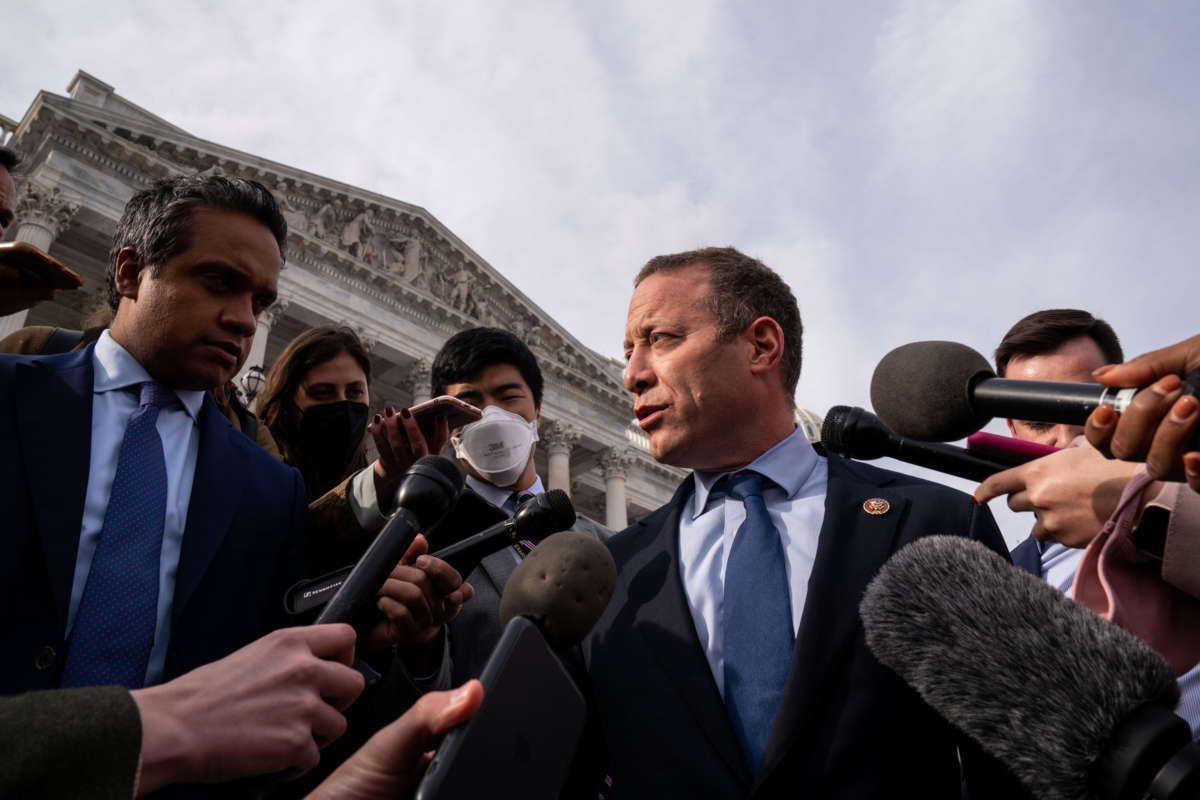A new analysis shows that conservative Democrats’ tax reform plan will give a large tax cut to a majority of the country’s millionaires — despite the conservatives’ insistence that the reconciliation bill cost the government as little revenue as possible.
The analysis from the Tax Policy Center shows that about two-thirds of people making over $1 million a year would get a net tax cut from the reconciliation plan, with an average of about $16,800 in cuts. Just under 80 percent of people making between $500,000 and $1 million a year, meanwhile, will see a tax cut of around $8,500 per year.
This is largely due to the state and local taxes (SALT) deduction cap increase that conservative Democrats like Representatives Josh Gottheimer (New Jersey) and Tom Suozzi (New York) have recently shoved into the Build Back Better Act. The lawmakers have been insistent that the increase — which raises the amount that taxpayers can deduct based on state and local taxes from their federal taxes to $80,000 — would benefit the middle class.
However, the Tax Policy Center finds no such thing. “Despite what its promoters say, raising the cap to $80,000 would provide almost no benefit for middle-income households,” wrote the Tax Policy Center’s Howard Gleckman. According to the analysis, those households would see tax savings of only $20 for 2021.
Other analyses of the SALT cap increase find similar results. The Committee for a Responsible Federal Budget (CRFB) wrote earlier this week that a household with an income over $1 million a year would receive ten times more money from the SALT increase than middle-class families would receive from the child tax credit expansion in the bill, for instance.
But Gottheimer and Suozzi have been doggedly fighting for the SALT cap increase, hinging their support of the reconciliation bill on its inclusion. Previously, they wanted to repeal the cap completely, and rejected a plan from Sen. Bernie Sanders (I-Vermont) to repeal the cap only for people making less than $400,000 a year.
Instead, as a supposed compromise, the current proposal lifts the cap from $10,000 to $80,000 — allowing some wealthy taxpayers to pay even less in taxes than the already -low rates given to them by Donald Trump and Republicans in 2017.
An analysis by CRFB earlier this week found that the SALT deduction cap proposal would result in lower tax collection over time, even though the cap would revert back to $10,000 in 2027. It would cost $285 billion during the five years it would be increased, the analysis finds — and in the meantime, the bill would add $200 billion to the deficit overall. Meanwhile, an earlier analysis of a plan to raise the cap to $72,500 found that the plan would be one of the costliest parts of the reconciliation bill.
It’s ironic that the cap increase would cost the government revenue. Conservative Democrats like Suozzi and Gottheimer have insisted upon the SALT cap increase while also threatening to withhold their votes for the reconciliation bill if the Congressional Budget Office (CBO) finds that it would add to the deficit. Notably, the CBO has frequently shown bias against progressive policies.
The inclusion of the cap increase reveals conservative Democrats’ real priorities for the reconciliation bill. While Sen. Joe Manchin (D-West Virginia) has whinged for months about critical climate proposals and child care proposals like the child tax credit, going on and on about the deficit, he has had no complaints about the SALT deduction cap raise that would primarily benefit the rich.
Join us in defending the truth before it’s too late
The future of independent journalism is uncertain, and the consequences of losing it are too grave to ignore. To ensure Truthout remains safe, strong, and free, we need to raise $46,000 in the next 7 days. Every dollar raised goes directly toward the costs of producing news you can trust.
Please give what you can — because by supporting us with a tax-deductible donation, you’re not just preserving a source of news, you’re helping to safeguard what’s left of our democracy.
